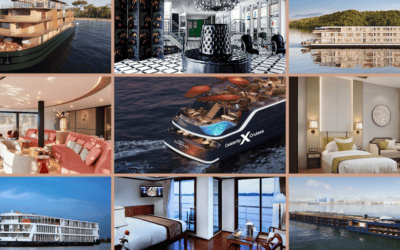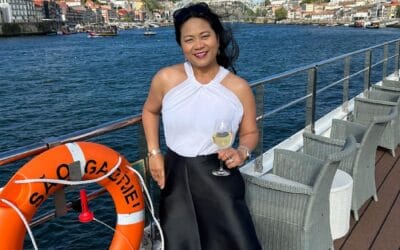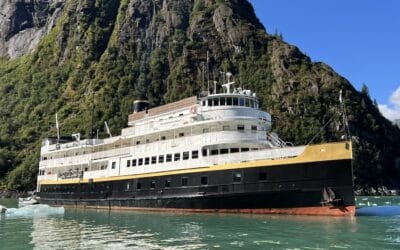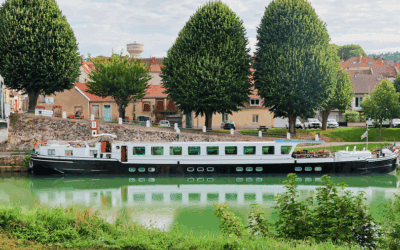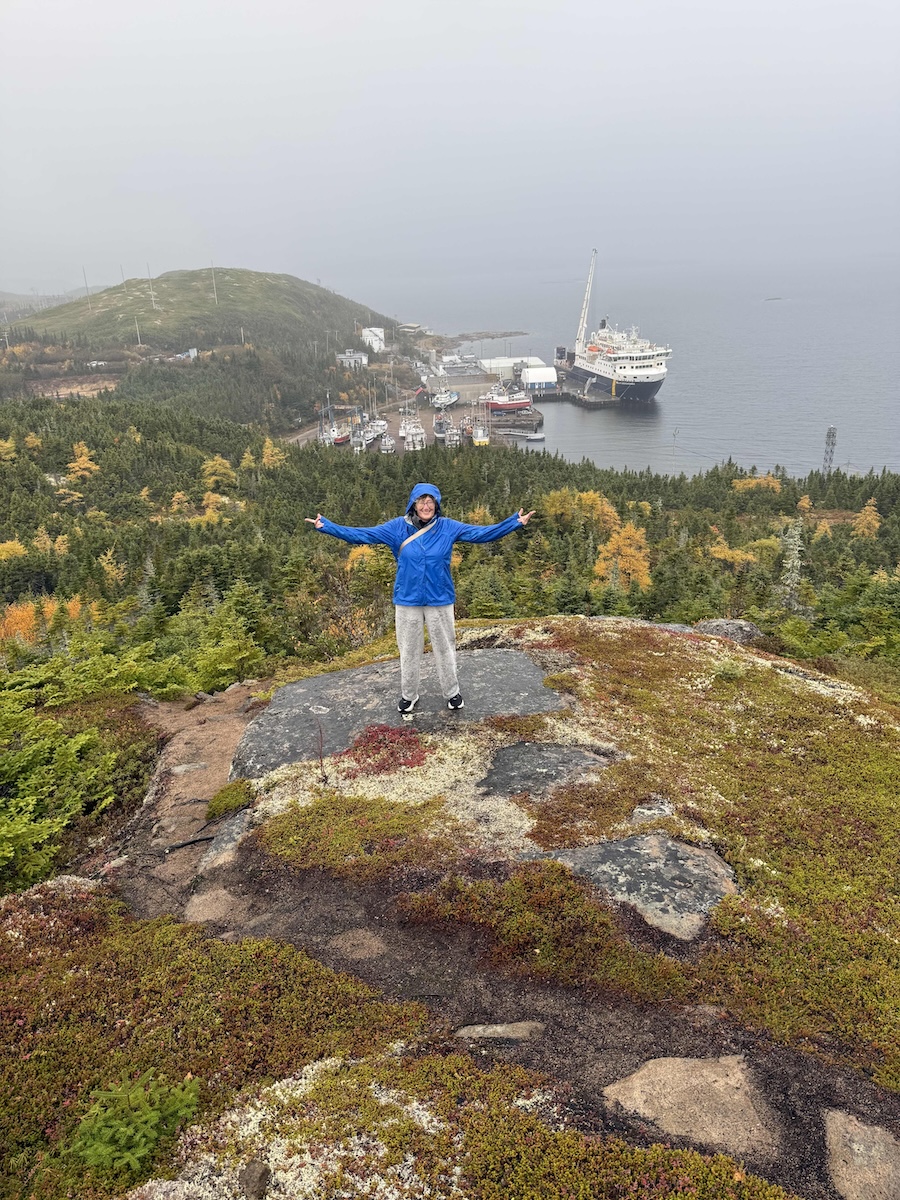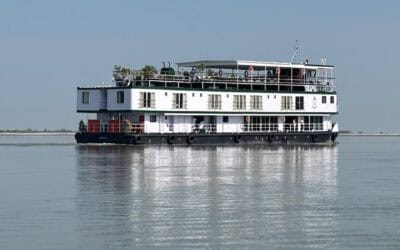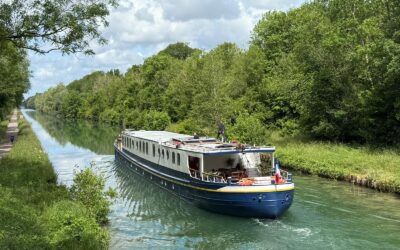Barge Cruising in France
By Ben Lyons.
Casting off from the quaint French town of Chateau Thierry, it was immediately apparent our barge trip would be at a different pace — literally and figuratively — from other cruises.
Once up to ‘full speed,’ I scanned the shore to gauge our progress; we were matching the pace of brisk walkers. Onboard with me was only my mother, one other couple, and the Captain and chef.
The hustle of New York City, where I live, had rarely seemed so far away.
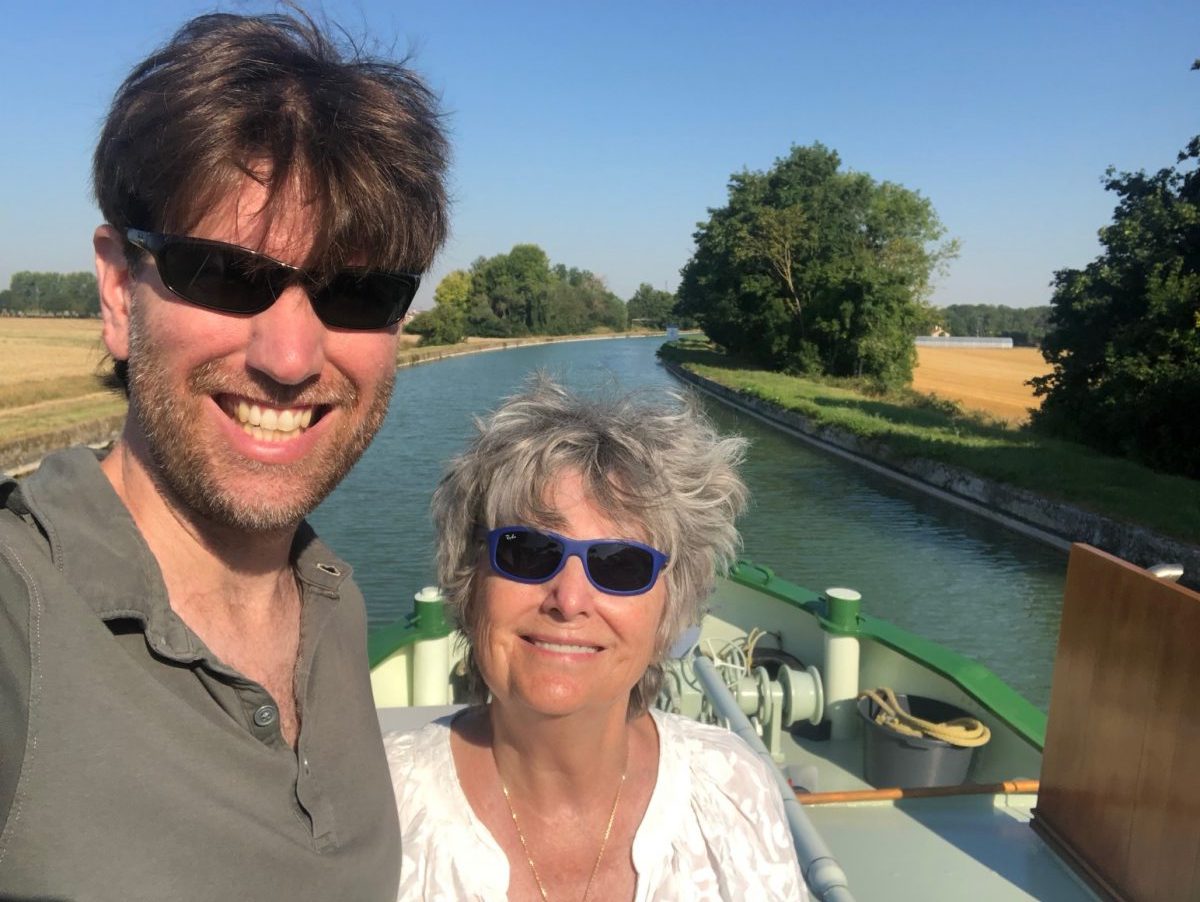
Mother and son bonding on a barge! * Selfie: Ben Lyons
We were spending the week barge cruising in France through Champagne onboard the 1966-built barge Johanna. Marketed by Barge Lady Cruises, she spends almost the entire summer cruising between Chateau Thierry and Reims, and can accommodate six passengers when full.
Her Belgian owners, Capt Kris and his wife Patsie, who is the chef-deckhand-housekeeper, purchased her in 2012 and after a lengthy refit, began running formal cruises a few years ago.
A third crew member slept onboard, but then drove the barge’s van while we were underway each day and acted as a guide during the included shore excursions.
Like almost all barge trips, except for a tip at the end, everything was included; we didn’t take out our wallet once.
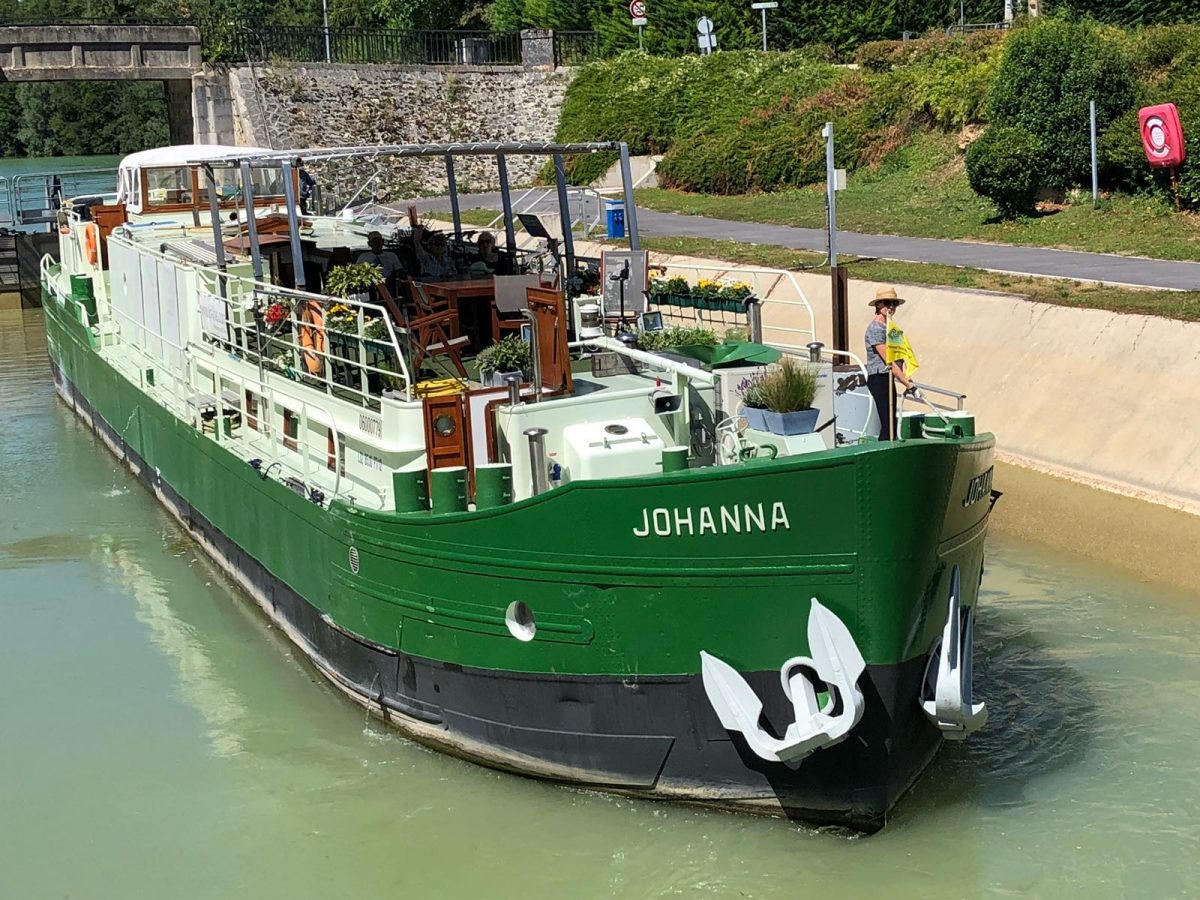
The 1966-built Johanna barge in France. * Photo: Ben Lyons
Subscribe to our monthly small ship cruise email
Subscribe to QuirkyCruise.com for monthly curated newsletters highlighting our top small cruise ship reviews, round-ups & offers!
Slow & Easy Barge Cruising in France
Both my mother and I found the idea of a week on a barge idyllic. As someone interested in all things maritime, a barge trip had long appealed to me with its slow progress through twisting interior waterways and close passes of idyllic towns along the way.
Barging seemed to be a ‘slow cooker’ style of cruising — an excellent way to let a destination soak in and extract all the flavors you would miss on a more conventional whistle stop tour.
Surely sailing on a barge, tying up every night in the center of a city, would be the ultimate destination immersion by watercraft.
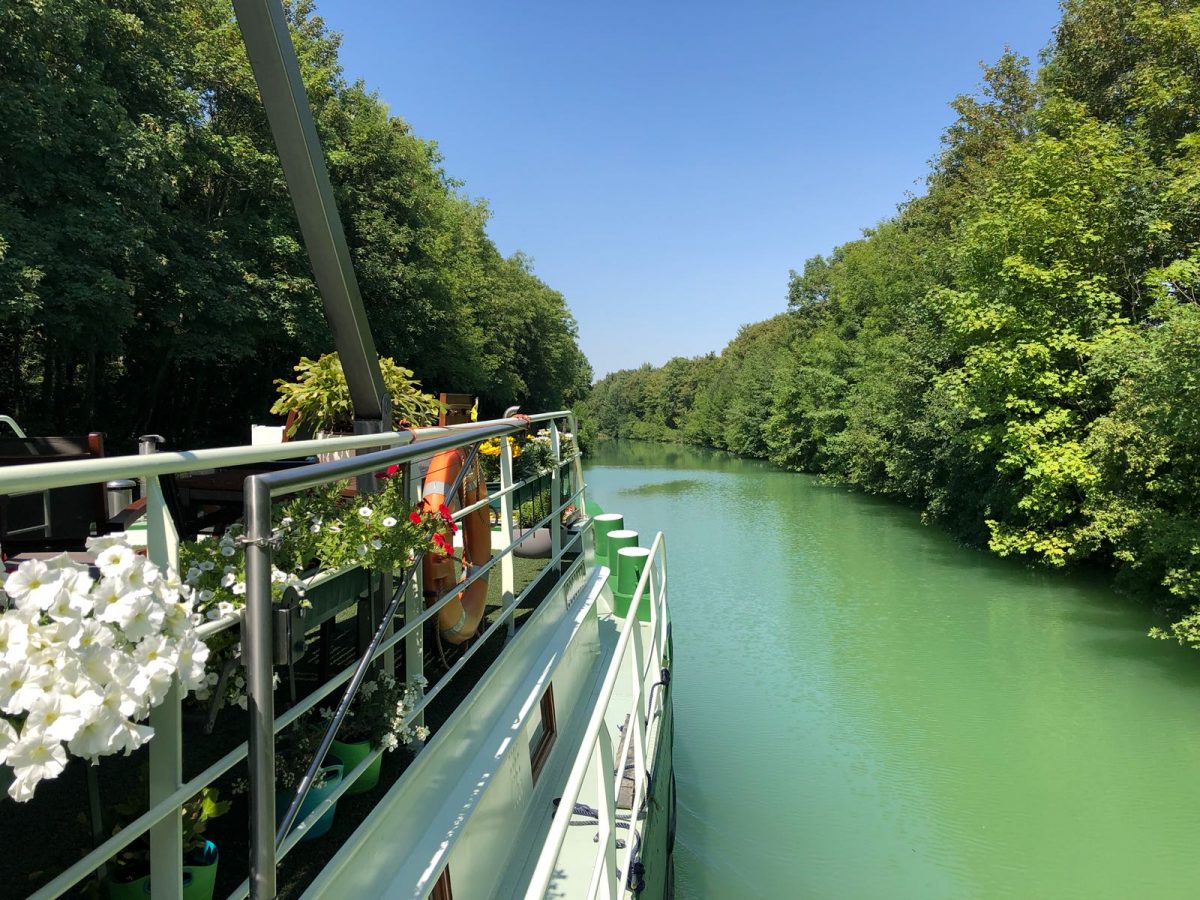
Following the at times snaking canal system. * Photo: Ben Lyons
After only a few hours onboard Johanna, we quickly fell into her unhurried pace.
Traveling between three and six miles an hour, and with no organized activity when onboard except eating, there was little else to do underway except sit on deck, read, talk or watch the countryside go by.
And for us, that was just dandy; time underway on the barge ended up as the preferred way to spend the day for both us and the other couple onboard.
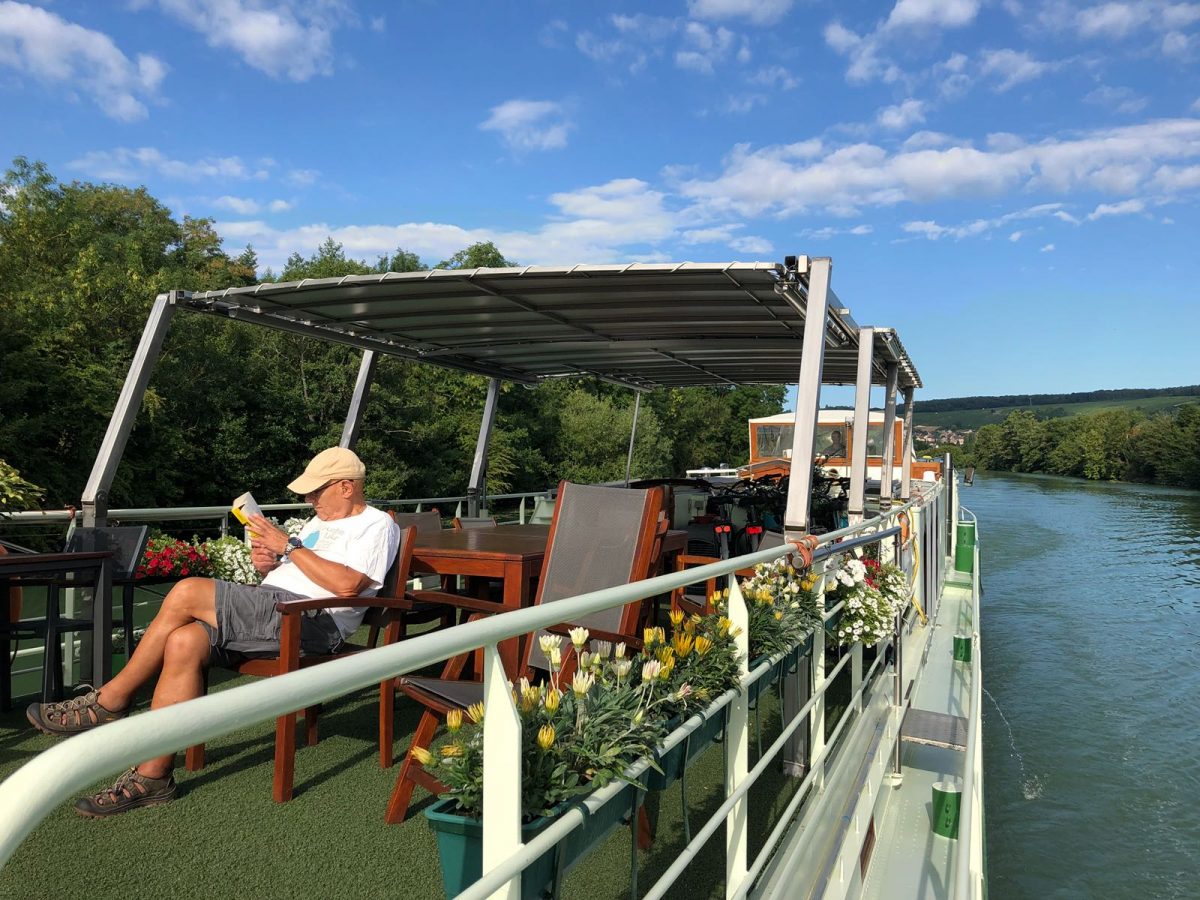
A fellow passenger enjoying the slow and easy life aboard a barge cruise. * Photo: Ben Lyons
Almost every morning we would be underway by 9am for approximately four blissful hours before arriving at our evening mooring after lunch.
We passed scenes of children fishing along the riverbanks that echoed Mark Twain, joggers getting their morning exercise, farmers tending their fields or commuters leaving home for work. Poking along the waterway felt intimate; trees and countryside were almost within reach, and there was time to take it in, to listen and to see the passing country.
Some days, we gazed at bucolic landscapes with vineyards reaching to the river. Other days, the river passed through a dense layer of trees and thick shrubbery, its sharp twists and turns leaving us wondering what was around the next corner.
(For the second half of our trip, we navigated the Canal de l'Aisne à la Marne. Completed in 1866 for commerce and trade, it was straighter and significantly narrower than the River Marne.)
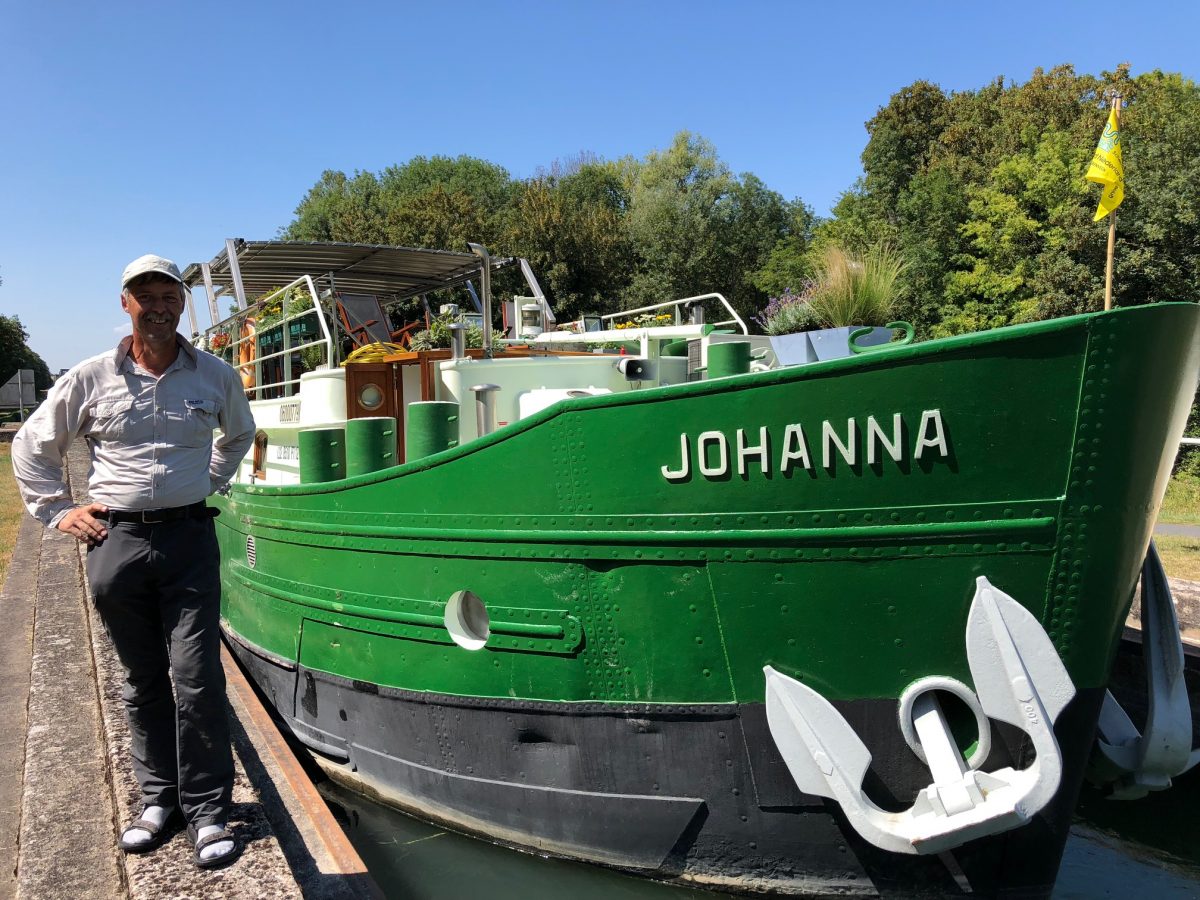
Caption Kris of the Johanna. * Photo: Ben Lyons
Evident throughout our week was Captain Kris’ skill at maneuvering Johanna. Canal locks, which raised or lowered the barge approximately six feet each time, were scattered every few kilometers. Johanna’s 105 foot x 16 foot hull, the maximum size that could navigate this portion of the Marne, squeezed in with mere inches to spare on either side.
Later, he piloted us through the 7,710 foot long, 1856-built Billy-le-Grand Tunnel. I had never before taken a ship through an underpass, much less one that took 30 minutes to traverse!
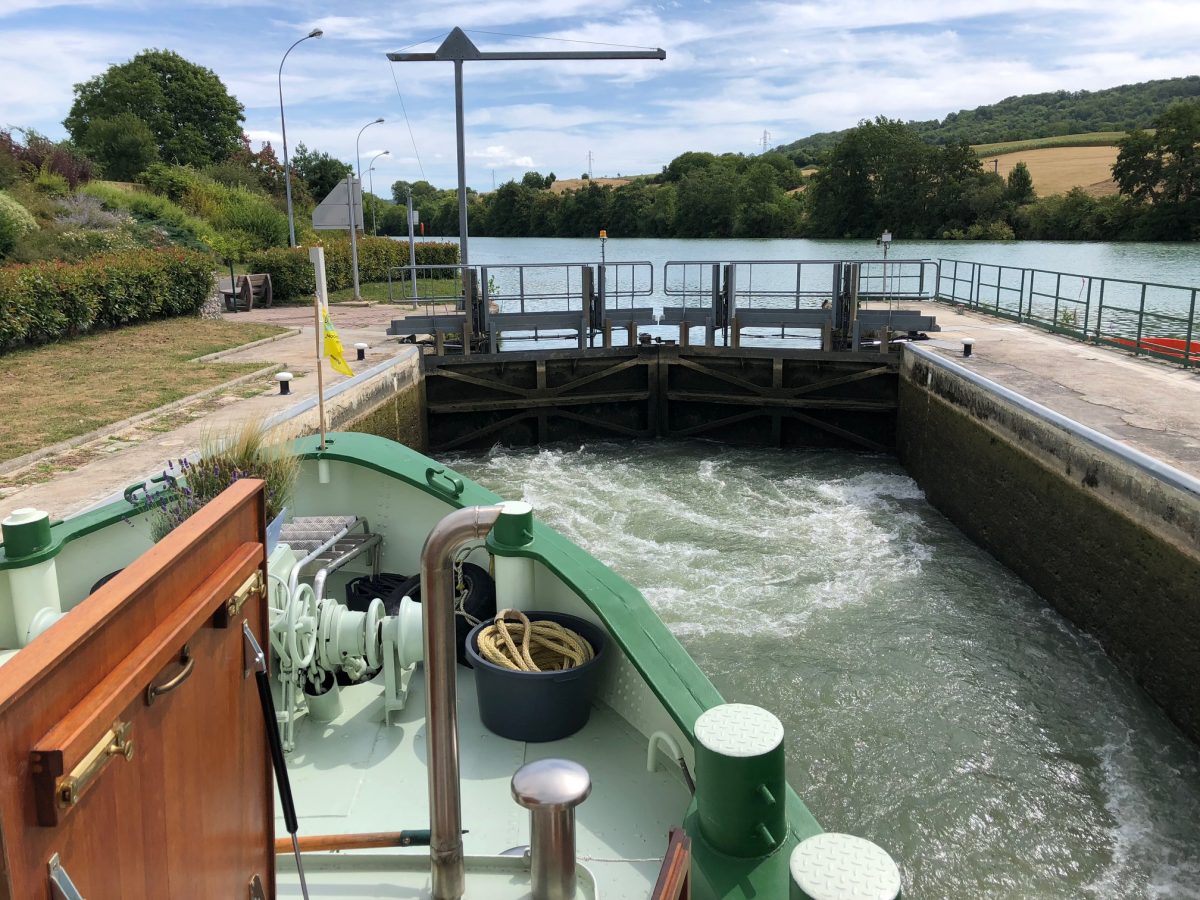
One of the many locks traversed. * Photo: Ben Lyons
Charming Johanna
While the Johanna may never be confused with the Queen Mary 2, on which I have spent much time as an officer, what she lacked in stature, she certainly made up for in charm. She appeared tidy and well kept; her proud, raised bow and partly riveted green hull oozed personality. Boxed flowers and herbs lined her rails, and a gracefully rounded stern belied her former life as a cargo barge.
Touring the entirety of the barge took all of a minute. The top deck had a large table for dining or lounging, along with an adjustable sunshade that could lower when going under low bridges. Down a steep set of stairs was the dining room/lounge.
On the starboard side was a dining table large enough to comfortably seat 8; on the port side, a few shelves with books, and seating for four people. Behind was the open kitchen, and large windows looking out onto the passing landscape. Down three more stairs and directly below the open deck were three identical cabins, each big enough for a pair of twin beds (convertible to Queen sized) and a very small bathroom but not much else.
That was it — a top deck, a small lounge and dining area, and very small cabins. Everything was comfortable, appealing and modern.
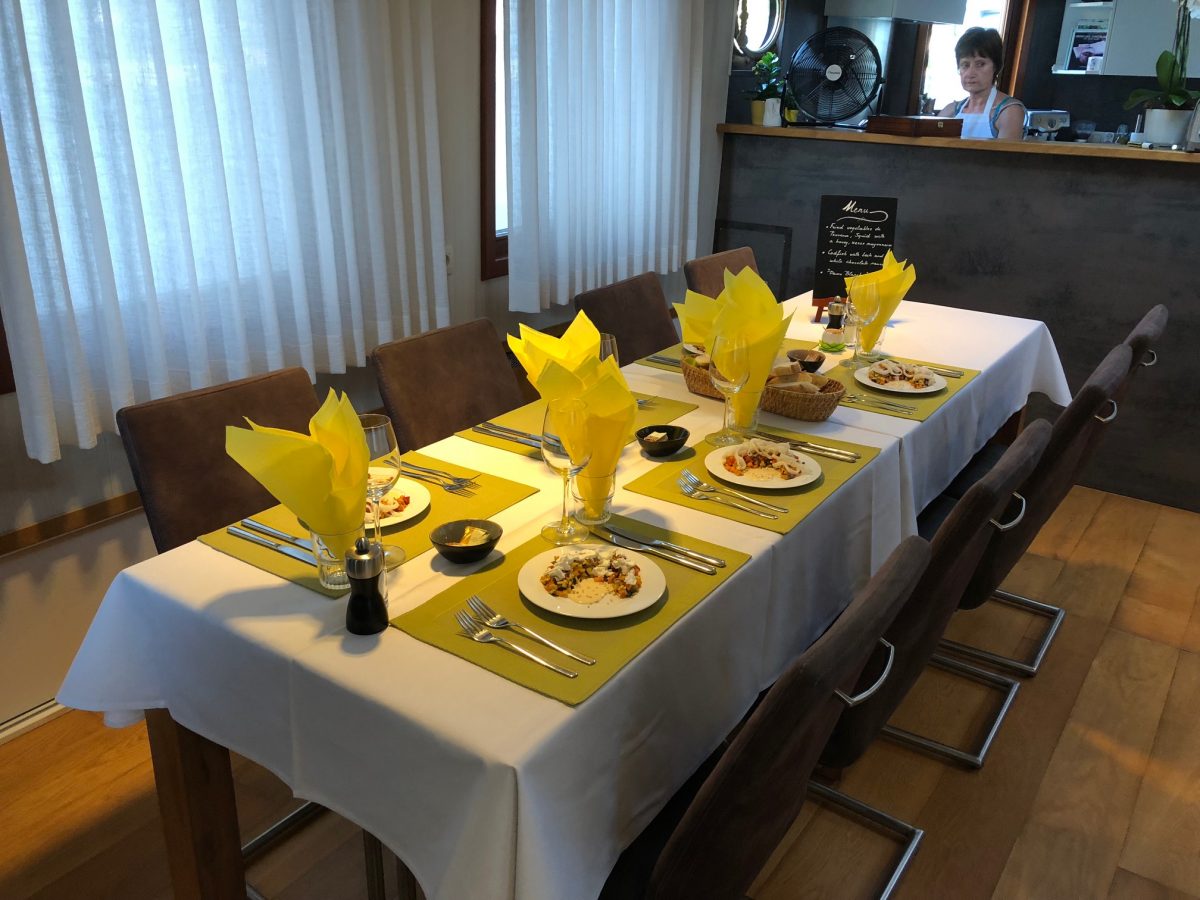
The indoor dining area. * Photo: Ben Lyons
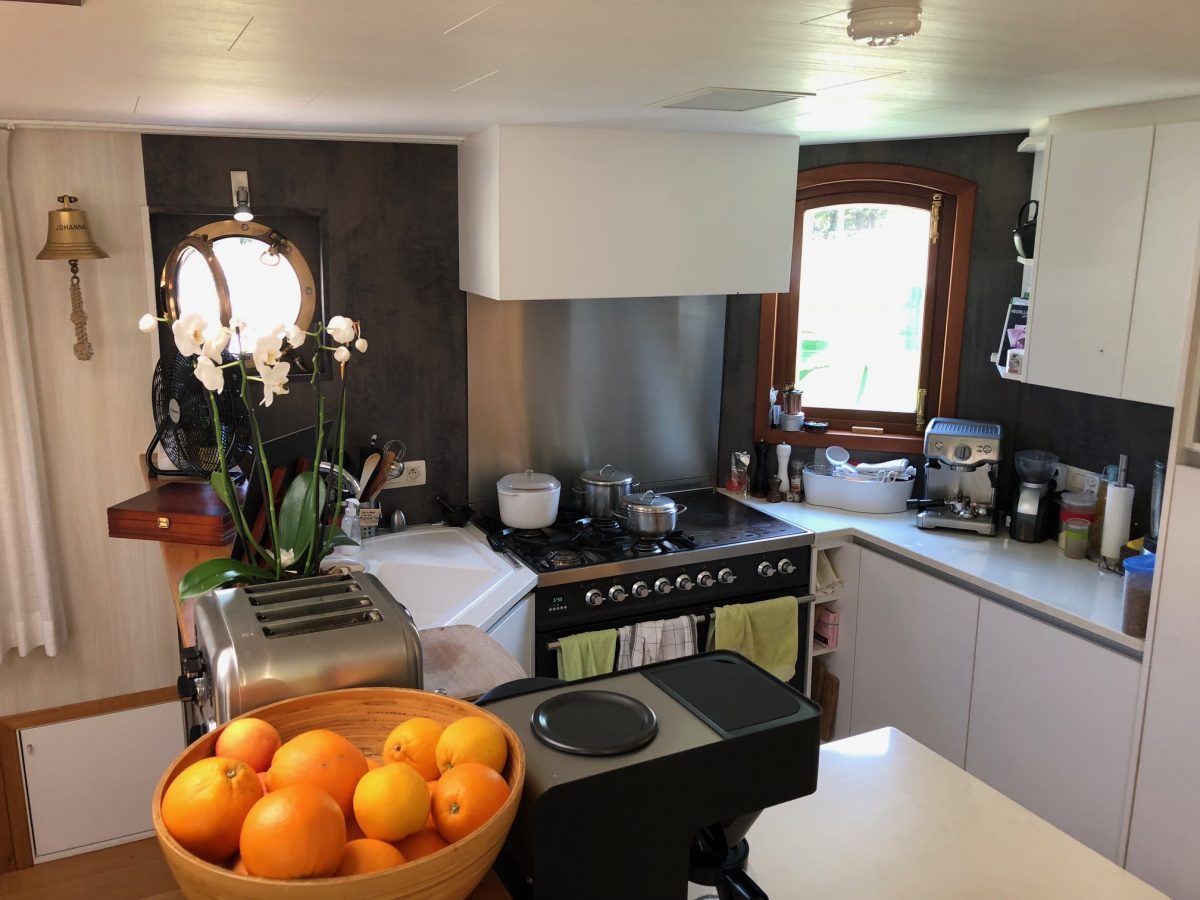
The galley and indoor dining area. * Photo: Ben Lyons
A Focus on Food & Drink when Barge Cruising in France
Patsie, in addition to her duties as deckhand and housekeeper, was also the chef! Breakfast each morning was yoghurt, freshly cooked eggs, fresh baguettes and cheeses, and lunch was normally a light and flavorful salad. The first salad upon boarding more than won us over, with mozzarella, raspberries, onions and mint and a selection of fresh local greens and herbs.
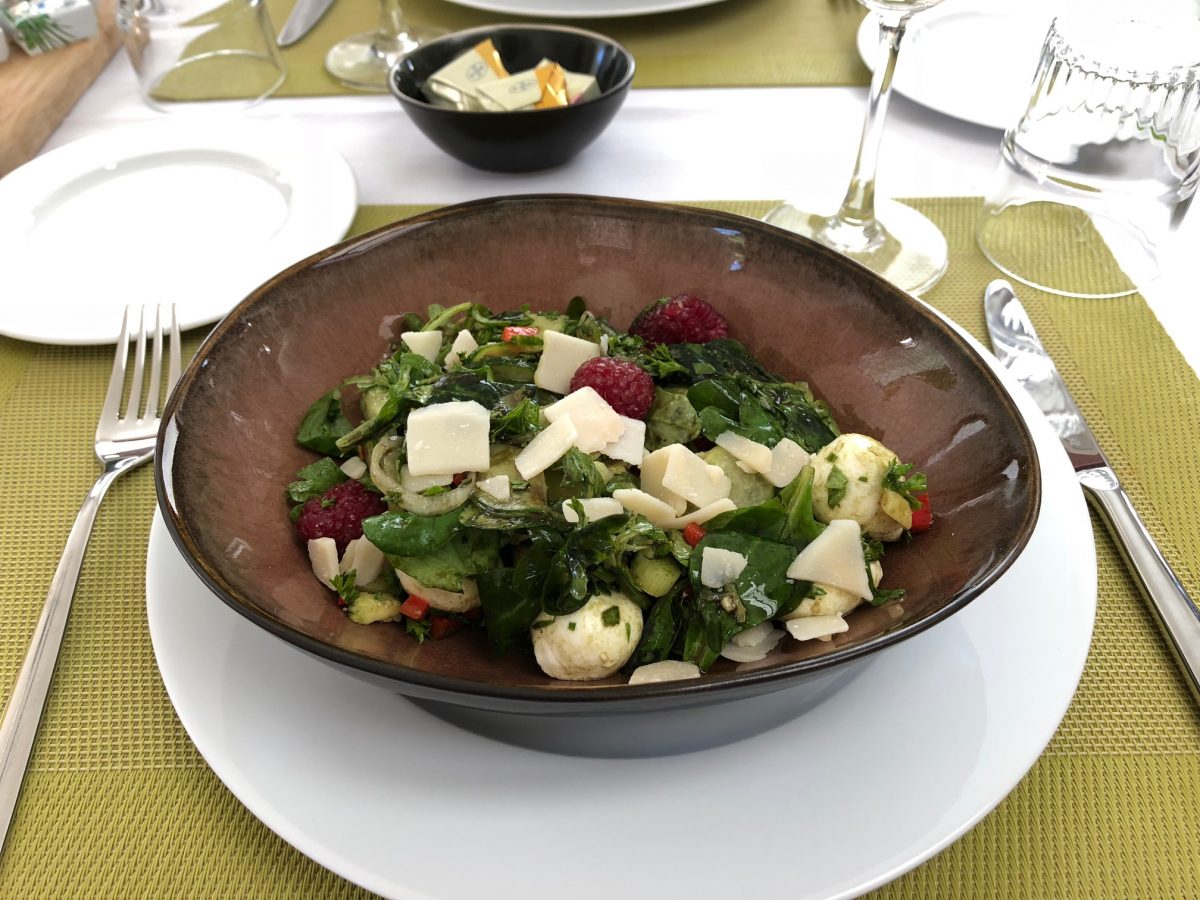
Ben's fave salad of the week! * Photo: Ben Lyons
In the evening, dinner was three courses, including a dessert, with some standouts being a cappuccino of tomato with tiger prawns, a lamb fillet with green beans and “Belgian” fries, and codfish with leek and a white chocolate sauce.
Patsie brought her own style of cooking to the barge, mixing French accents with fresh vegetables and creative combinations. Of course, wine was offered at every meal — or even in-between — and never disappointed.
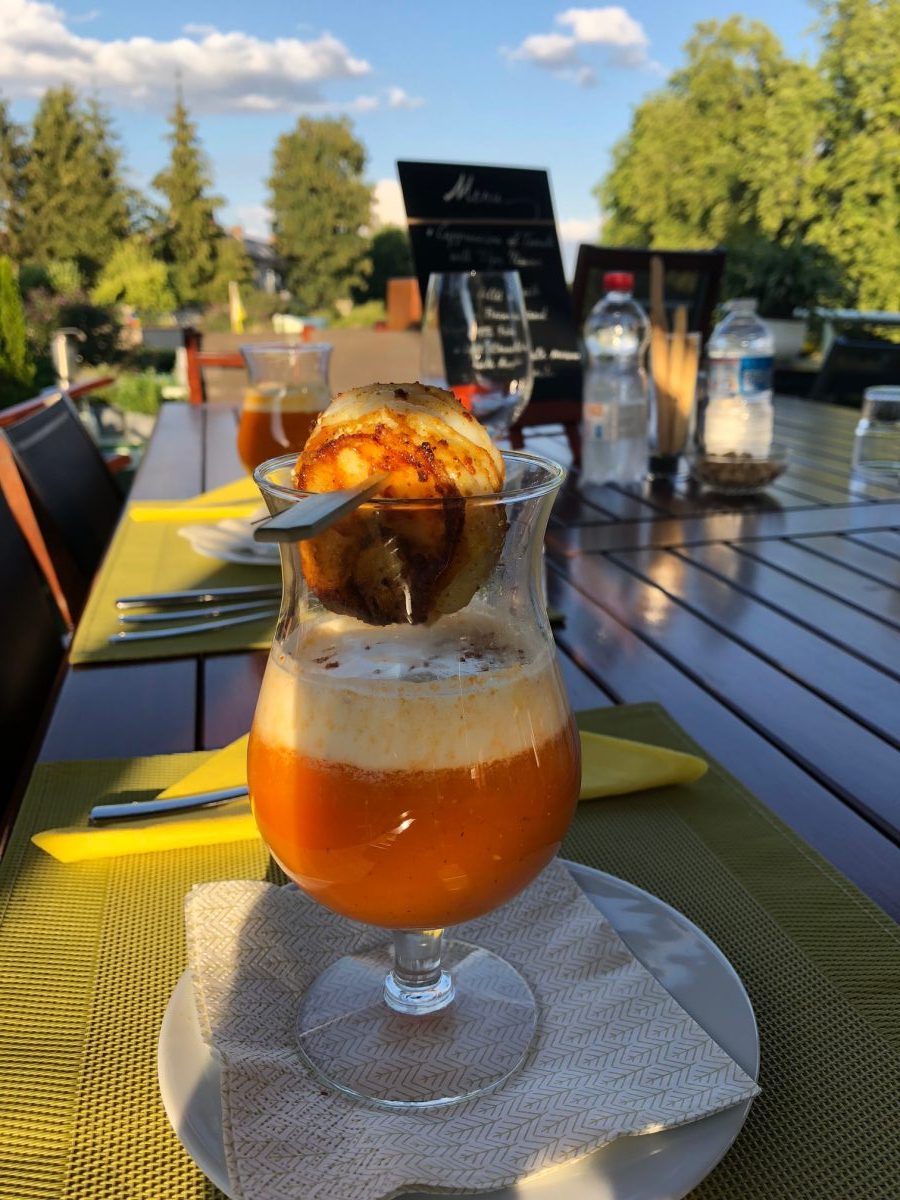
Patsie's delicious cappuccino of tomato with tiger prawns. * Photo: Ben Lyons
The Ports & Recreation Along the Way
Despite my high expectations of barge and shoreside blending seamlessly into a destination immersion, we found the arranged shoreside activities occasionally a bit lacking. While our cruise was themed “Chocolate and Champagne” — a splendid theme anywhere! — Captain Kris was understandably a bit thrown to discover none of his passengers were interested in going to vineyards every day, and we were slightly disappointed not to taste freshly made chocolate onboard on a daily basis!
To accommodate us, new tours were offered instead of vineyard visits — a trip to a museum in the tiny town of Oeuilly, or a stroll and beer in the town square at Hautvillers (where Dom Perignon reportedly invented champagne) — but options were limited even though we were only four passengers. And with blistering hot weather setting records in France that week, often all we wanted was to return to the barge after a few hours; walking around anywhere in that heat would not have been pleasant.
There were a few exceptions, of course — a visit the first afternoon to WWI monuments and grave near the Battle of Belleau Wood was particularly compelling.

The WWI cemetery near the Battle of Belleau Wood. * Photo: Ben Lyons
I also suspect that if my wife had been able to join me on this trip, we would have taken more advantage of the ability to break off and do more independent exploration. (Our third crew member was really more driver than tour leader, however.
This was only his second trip, and truthfully, he hadn’t had time to fully develop either the expertise or charm that might have been expected; while our guide was a disappointment, most are very competent and are an integral and positive part of the experience.)
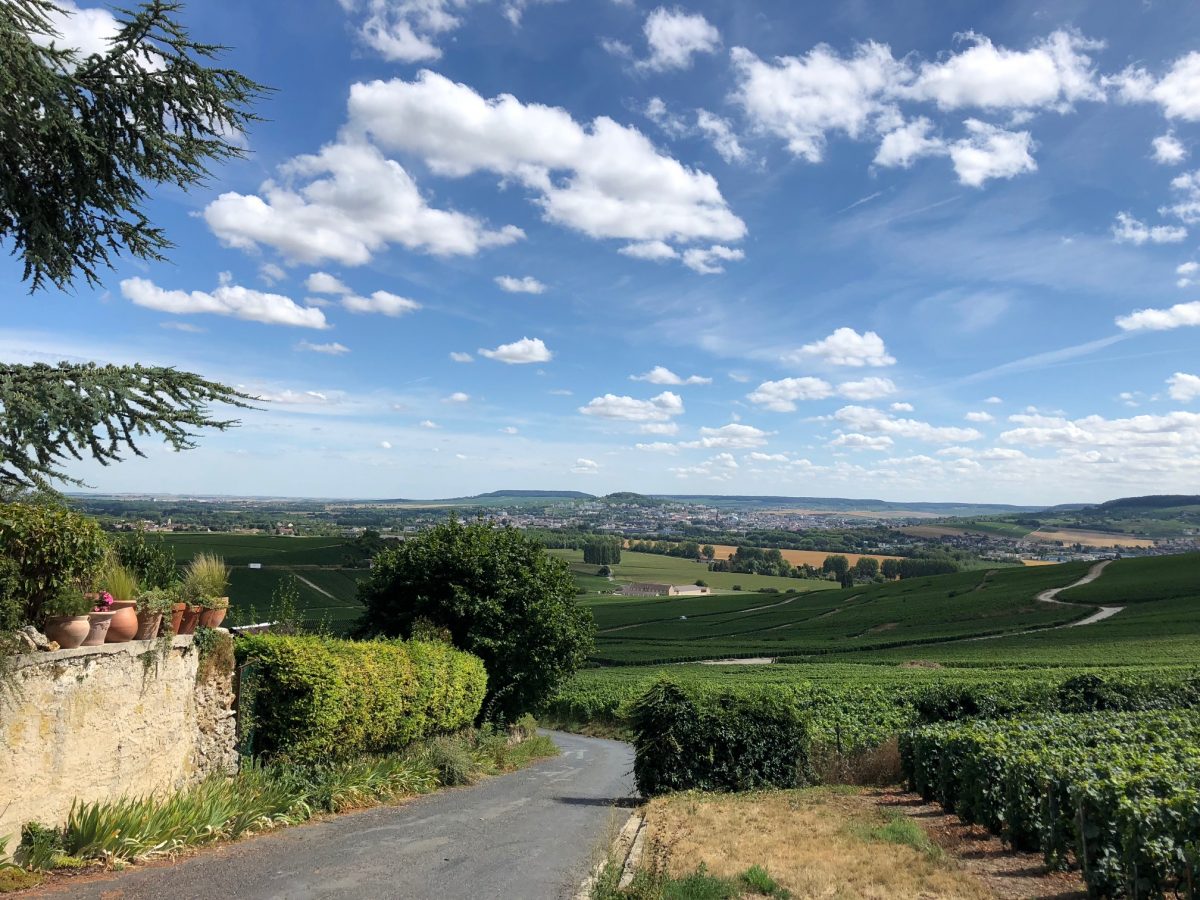
The beautiful countryside along our route. * Photo: Ben Lyons
Kris and Patsie did arrange for dinner ashore (paid for by them) for two out of our six nights onboard. One in particular — in the Champagne epicenter Epernay — was wonderfully memorable, with a charming outdoor garden and delectable modern French cuisine.
This dinner ashore allowed us to soak in more local ambiance than is often possible to achieve on a larger cruise ship.
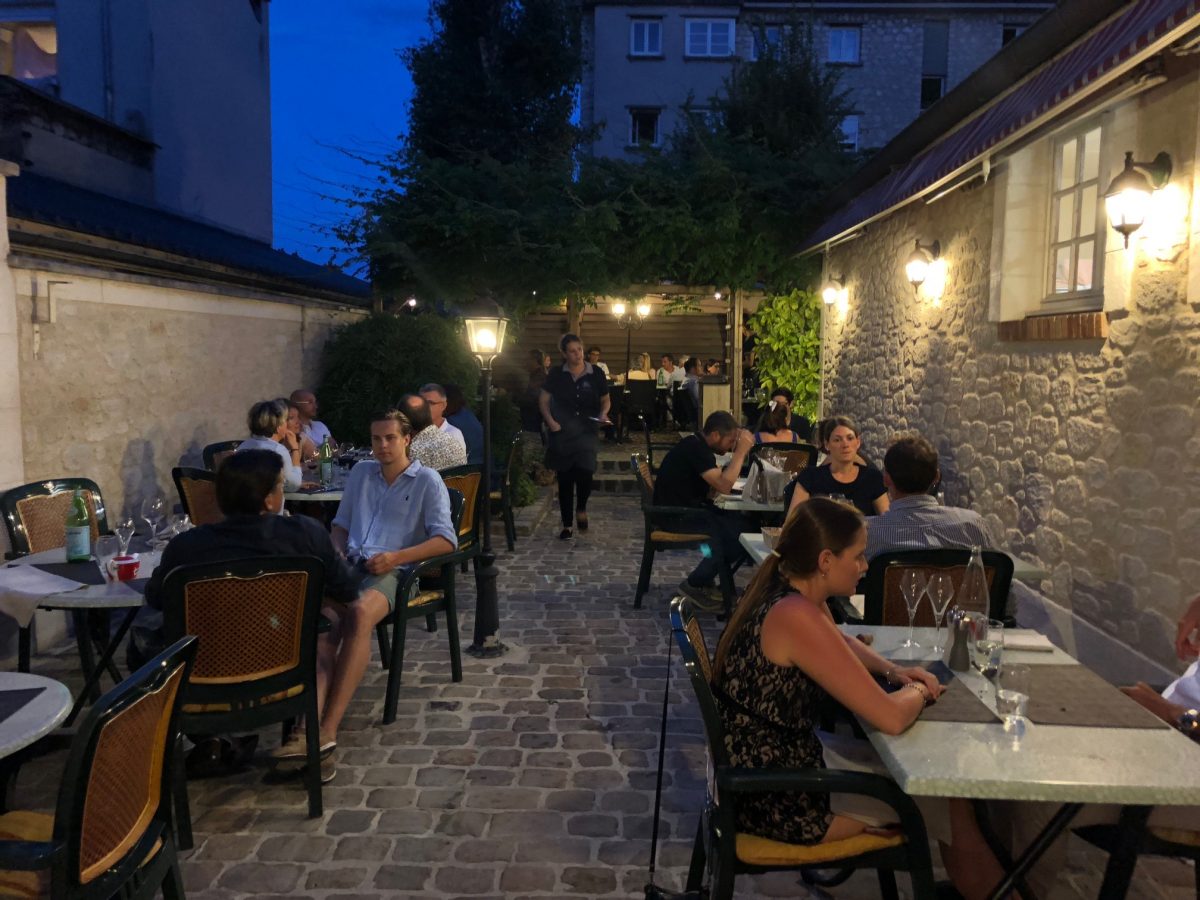
Dining in town was arranged two out of the six nights. * Photo: Ben Lyons
For those wanting a bit more active day, tow paths along the canal made easy walking or biking paths. Many (but not all) days, it was possible to jump off at one set of locks, bike along the canal, and rejoin the barge a few kilometers away at the next locks.
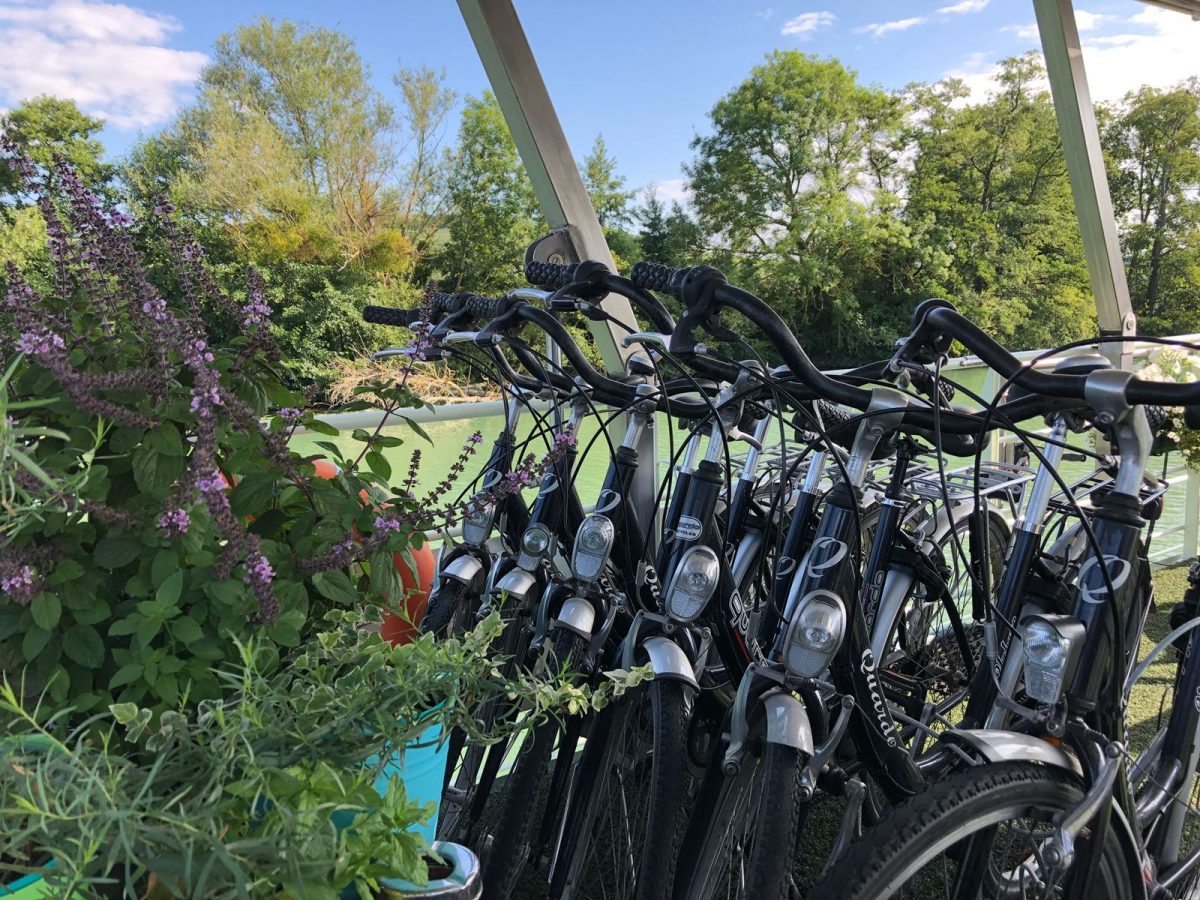
Johanna's bikes for use along the tow paths. * Photo: Ben Lyons
On the days without the tow path, I imagine more challenging or lengthy routes into town could have been found, but I wouldn’t have wanted to have missed the time underway on Johanna. Instead, every morning I would go for a run along the river bank or up into the nearby towns or hills, taking in sweeping views over the tidy vineyards.
I never worried about missing the barge — only once I returned and stepped foot onboard were the engines started and preparations made to set sail.

Ben's jogging route took in lush vineyards. * Photo: Ben Lyons
The End is Nigh
On the last day onboard Johanna, we watched the passing landscape change from rural to suburb to urban during the last few hours underway. The larger city of Reims, where kings of France were once crowned in the imposing cathedral, was approaching. During our entire week sailing the Marne, we had only traveled about 60 miles — a distance most ships cover in three hours.
The next morning, I boarded a TGV high-speed train and sped west to Charles de Gaulle airport to catch my flight home. After only 25 minutes on the train, I had already passed Chateau Thierry and retraced our entire voyage!
Looking out the window, the passing vineyards and towns sped by, blurring without distinction. Convenient, of course, but I’ll take the walking pace of a charming barge that lets me soak in the meandering canals any day.

The ending to a lovely week. * Photo: Ben Lyons
Considering a Barge for the First Time?
While all barges are minuscule in comparison to a typical cruise ship, there are still significant differences you should consider when choosing which barge to sail on:
➢Number of Fellow Passengers
Barges are not all as small as Johanna, and that is probably a good thing. With a capacity for only six passengers, Johanna feels truly homey — a veritable floating B&B. (Indeed, Johanna acts as a stationary B&B in the winter in Bruges.) For families or small groups of six friends, the ability to take over the entire barge and enjoy shared dinners on deck during sunset or leisurely wine tastings on shore seems ideal.
“The vast majority of our bookings, say 70%- 75%, are full-boat charters. In fact, most barges are charter-only, and have real appeal for groups who tend to travel together such a families, small parties of friends, gal pals, etc,” says Stephanie Sack, marketing maven for Barge Lady Cruises.
However, having only two (in our case) or four other passengers to mingle with has risks if they are strangers. Imagine the challenges of sharing not just a dinner table with incompatible companions — but breakfast, lunch, dinner, and all shore excursions and afternoon activities! We were very lucky that our fellow passengers were definitely companionable, but a barge carrying 12 or so passengers might be a safer bet when joining as a single or couple. (Johanna has plans in the future to increase her capacity to eight passengers.)
➢Number of Crew
On Johanna, the crew comprised the husband and wife co-owners of the vessel — Captain Kris and chef-host-housekeeper Patsie. The third crew member acted as a guide for shore excursions. Running a barge and cooking for everyone takes a lot of work, and it was evident to us onboard how hard Kris and Patsie work. A larger barge, which would have crew dedicated just to cook or lead shore excursions, would naturally have a different level of service and expertise. More luxurious barges may have six crew members but only 8 or 12 passengers.
➢Barges Reflect Their Owners
The owners and/or captains on barges can make a big difference; in the case of Johanna, we were staying in Kris and Patsie’s floating year-round home. We enjoyed the informal atmosphere —including having their two cats living onboard — but others wanting more polished service or a more formal ambiance may want to consider a larger barge with more crew.
➢Facilities
As you would expect, the larger the barge, the more facilities you can expect to find. On Johanna, the dining room doubled as a lounge; almost all our time was spent outdoors, and happily so. But many barges have a full deck dedicated to a dining room and separate lounge, giving a pleasant alternative to sit inside in case of excessive heat (as on our week) or bad weather. Some barges even have small hot tubs or plunge pools! Most barges, however, will not have any elevator, and almost all offer bicycles free of charge.
RELATED: For more coverage of Ben & his mother Jane's barge cruise, check out Jane's article here: “A Mother & Son French Barge Meander.”
RELATED: Here are Ben's VERY useful Barge Cruises Tips!
RELATED: Need help deciding which barge to choose? We're here to help, just ask Heidi … [email protected].
![]()
Don’t miss a post about small-ship cruising, subscribe to QuirkyCruise.com for monthly updates & special offers!
© This article is protected by copyright, no part may be reproduced by any process without written permission from the author. All Rights Reserved. QuirkyCruise.com.




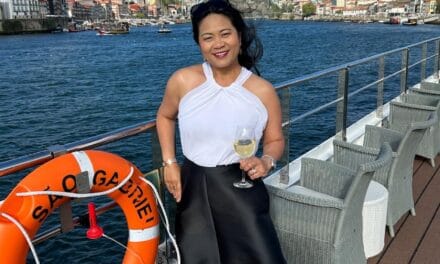

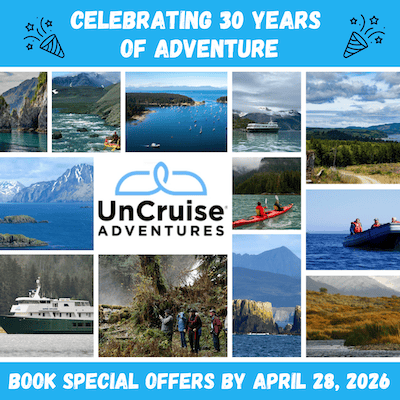
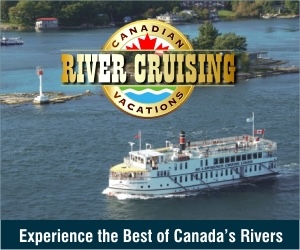

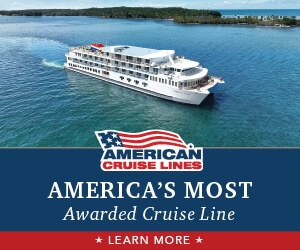




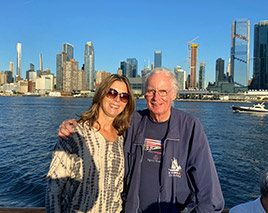 HEIDI SARNA
HEIDI SARNA


